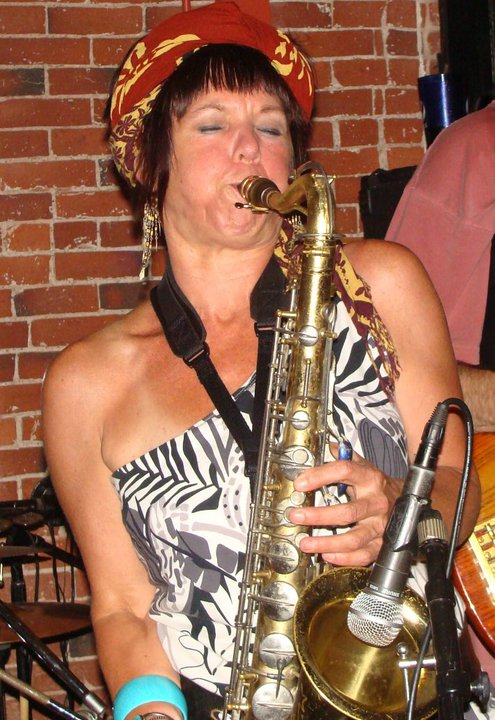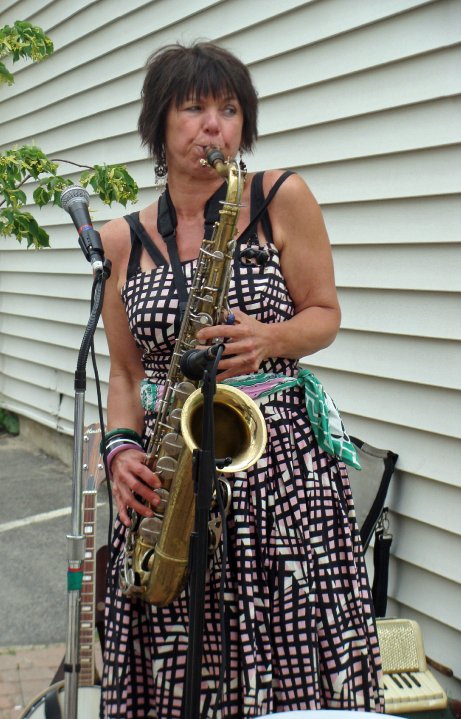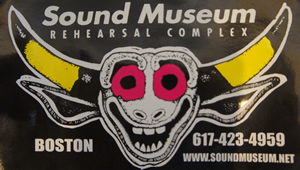 Kat-Lee Newton has been kicking around the music circles of her native Dover, New Hampshire since moving back from New Orleans a few years ago. Her band Dixie Kats has been playing Kate O’Shea’s in Seabrook, New Hampshire this past summer. Newton plays sax and accordion for the two year old band.
Kat-Lee Newton has been kicking around the music circles of her native Dover, New Hampshire since moving back from New Orleans a few years ago. Her band Dixie Kats has been playing Kate O’Shea’s in Seabrook, New Hampshire this past summer. Newton plays sax and accordion for the two year old band.
Surf, rockabilly, old blues, old vintage jazz, old country, and old rock and roll make up the set lists for Dixie Kats. Newton got quite an education about that kind of roots music when she was working with an eclectic batch of musicians every day of her life in New Orleans.
“People come from all over to play,” she said. “For me, it has some of the best musicians in the world, and I went there to learn,” she said. Newton lived in New Orleans from 1990 to 2006. She went back briefly after Katrina, but only for a year. Newton’s return to her hometown was prompted by her mother’s death. Her dad was alone, and post-Katrina had nothing to anchor her there.
She played mainly with a female horn band called Some Like It Hot for seven years, playing Dixieland tunes. Aside from Newton on sax, women played trumpet, trombone, and drums. Some Like It Hot played in all manner of venue, starting out in block parties, when the city blocks off Royal Street from 11:00 a.m. to 4:00 p.m. Three or four bands would set up in different corners of the road.
From there, Some Like It Hot graduated to clubs and private parties. “Down there, you’ve got parties,” Newton said, stressing parties. She also participated in huge colorful Mardi Gras parades, eight to 10 parades during each Mardi Gras.
“It keeps you in shape because you’re walking,” she said. “But the most fun I ever had was on a cart, a driven cart, so I didn’t have to walk eight miles and find a bathroom.” These trailers were also amplified, which made things easier.
Newton’s Some Like It Hot played name clubs like Tipitina’s and Howlin’ Wolf and Gazebo and outside venues. Everyday there is music and Newton played Bourbon Street for a two year grind. “I didn’t go on until eleven at night. Eleven till two or four in the morning,” she said. “They don’t close. If it’s Mardi Gras, you play till six or seven. You can’t get home anyways. It’s a zoo.”
Newton used to find herself on stage looking up at the balcony to see people pulling up their shirts or pulling down their pants. “It’s stupid to me. But people come from Idaho, and they want to show their breasts, I guess, or beads, which you go to the store and buy for ten cents.”
Newton has difficult time recalling a specific memorable experience, since New Orleans puts a lot of wild experiences in your face daily. Sitting in with people like Rocking Dopsie, and Nathan Williams was part of the perks of living and playing there. Her band played a lot of festivals, French Quarter Fest, Satch Mo Fest.
“It’s the people, just the whole vibe of it,” she said. “People from all over the world come, and it’s the vibe. There’s all these bands. There’s 12, 14 stages or more for French Quarter Fest, and SatchMo fest is usually around August 4th, and it is hot.”
“God is it hot,” she said. “Sweltering, a hundred and four, a hundred and ten degrees.” She never passed out but she said, “I got pretty bitchy” and she drank a lot of water. Newton said she has enough experiences to tell stories for six days straight. The most indelible experience is an obvious one for anybody from New Orleans.
“Hurricane Katrina, that’s the saddest thing I’ve ever seen,” she said, becoming quiet, as she told how 80 percent of her city was gone.
“When we first got back, there were a lot of musicians gone,” she said. “A lot of people were gone. It was pretty amazing. People didn’t have electricity. There were some restaurants open but you couldn’t use credit cards. You find it interesting how society can break down and not build itself back up with little thing, like ‘We’ll we can’t run the dishwasher, so were using paper plates if you want to eat out,’ and that was the (restaurants) that were opened.”
There was still a functioning music scene when she returned. Her band played at Whole Foods parking lot that she got paid for in gift certificates, “which was fine with me because I spent a lot of money there anyway. We were thrilled with that, and tips. Don’t forget the tip jar.”
In normal circumstances, tip jars could be an entire income on Bourbon Street. Newton has a bizarre story to tell about a pre-Katrina gig. One night, a tipsy man comes in and buys himself a beer and Newton could see the man’s cash in his hand from the stage.
“When you’re dependent on tips, you can see when there’s money in somebody’s hand. You can see it. You’re looking. So, he buys a beer and throws the rest in the tip jar, and I’m like ‘OK, cool. ‘”
The story got more interesting. The bar patron continues to toss bills into the tip jar through out the night. “So, we’re playing and, we’re having a good time. Next thing, he pulls out a hundred, and pulls out another hundred, and he pulled out another hundred, putting these in the tip jar, and we’re like ‘Yay!’ Usually, it can be difficult down there. You might make five bucks in tips, and that’s going to pay for your cab home, or you might make a lot more. You never know. He ended up putting a few hundred in there that night. We were thrilled. And the guitar player looked at me and said, “I wouldn’t want to wake up next to him in the morning when he figures out where his money went.” Newton said this bar patron was on his way to California and he had decided not to go. He felt something ominous and he decided to drink instead.
After Katrina, bands didn’t have the tourists, they had FEMA employees, Red Cross workers, and carpenters coming in from all over. The workers were having a good time at night, and they still tipped. Newton was playing outside at night and a man approached them and asked if they had change for a hundred. Just as the banjo player was giving him change, Newton realized the man didn’t really have a hundred dollar bill in his hand. “I went ‘Oh, shit, it’s not a hundred.’” They were basically ripped off.
In one of Newton’s Facebook videos she was playing in a band supporting a burlesque show. It’s just one of the gigs she had to do in the colorful city. “You play for everything. You name it. You can’t be meek at heart because you’re going to see everything. I mean everything,” she said. Newton played with noted local bands like Molasses Brand Band, a mostly female act, and she saw the Preservation Hall Jazz Band.
Newton, originally born and raised in Dover, New Hampshire, moved to Boston for a while. She attended Berklee College of Music for one year. She said the college was over her head at the time. It was the 1980s and she was just starting to learn to play. Newton was not a musician growing up. She took up the sax as a young adult.
She dreamt of playing the sax after she heard Sonny Rollins and Argentina’s Gato Barbier, and she had decided to make it happen. “I didn’t realize it would take so long,” she said. “It depends on how much you can practice. When you pick up an instrument when you’re an adult, it’s not like when you’re a kid who can play and practice at home and not have to work and worry about rent, mortgage, and food. It takes a little longer.”
Newton also plays the accordion and mandolin, although they are not her primary instruments. She loves accordion, from listening to Louisiana music. Mandolin came to her through her love of strings. Roots music will always be her thing, including two different forms of jazz from two different cultures. Dixieland jazz comes from the “white” banjo-oriented sound and the jazz of band like Preservation Hall comes from black musicians. “Not that it can’t be crossed,” she said of the two jazz schools of thought.
Newton grew up listening to roots music like surf, rockabilly, old country, old rock and roll, and vintage jazz. “To this day those songs are great and memorable and they’re still being played,” she noted. “You’ve got songs that are a hundred years old that are still being played and people love them and they recognize them and I just love playing them. And they’re not easy, the traditional. You know why I love it? It’s feel. It’s a feel music. You’ve gotta have some soul. You’ve gotta have feel. You gotta have something to put into it. It’s art. It’s American music.”
Newton’s parents had this roots music playing in the house when Newton was a child. Her father now own 30,000 album, and her mother was a singer, beautiful voice, always singing. Her parents could really cut a rug on a dance floor and were known for their dancing. Her mother’s family were musicians. Her grandmother used to sing on the radio in New Hampshire with a brother in the 1940s.
Newton is also a lead vocalist and she has found the vocal chores to be rough going. “It’s scary,” she admitted. “You’re really putting yourself out there, but that’s what I love about it. That’s been the hardest thing about me singing is just putting myself out there and ‘Here I am.’ You’re putting your heart and soul out there.” Newton said she is “always shocked” at how well she goes over. “You just think, ‘Well, I don’t know if they’ll like it, but most people seem to, so…..”
Newton did not have a bio sheet prepared for the press or even this interview. “I’m not jumping out the gun to toot my own horn,” she quipped. Musically, she likes being front and center, she said. She sang Slim Harpo’s “Te Na Ne Na Nu,” one of her favorites to perform, at Ladies Of Blues at Fratello’s a few months back, perfectly capturing the exotic vocal phrases. Newton listens to a lot of Austin’s Lou Ann Barton who has recorded many Slim Harpo’s songs. Newton caressed the words with her voice. “That’s what I do,” she said. “I don’t have an Aretha Franklin kind of voice. I try to phrase more like Billie Holiday. That’s more my strong point than belting it out.”
Newton carries herself with an abundance of cool. Even if you don’t know her, you’re going to guess she’s an artist of some kind. She wears headbands and large earrings and her walk suggests the post-hippies attitude of the early 1970s. “I’ve always dressed a little eccentric. I get it from my mother. You should have seen her when she was in her prime. She’d go to the mailbox looking like a Hollywood star.” And, of course, New Orleans influenced her personal style and outfits. “You are who you are there. You can be who you are there. Nobody really looks twice,” she said.
These days, Newton is trying to put together a new band based out of her native New Hampshire. She doesn’t know if what she’s looking for is available in the Granite State. She wants a steel guitar player, a honky tonk piano player, a stand-up bassist, and a trombone player. Her guitarist in Dixie Kats, Larry Nickerson, excels at surf and other roots material. “Love Potion Number Nine” and any song from the Ventures are part of their live repertoire.
Newton looks forward to putting together her new band and getting into western swing.
www.facebook.com/people/Kat–Lee–Newton/100000037944363
–


